- Home
- Chris Pierson
Divine Hammer Page 6
Divine Hammer Read online
Page 6
They kept on, across the grounds of the Hammerhall until they came to the keep’s looming gatehouse. There they stopped, and Tavarre threw back his head and roared with laughter as he saw what lay on the cobbles there.
“Great gods!” the First Marshal exclaimed when he could breathe again. “You killed the bird.”
Cathan couldn’t help but laugh too. The clockwork hawk rested on the ground in a metal heap, alongside Cathan’s shield and helm.
“Think he’ll mind?” he asked.
Tavarre snorted, glancing at the sky. The sun had passed its zenith and begun to wester. The sound of bells rang out from the city. “Come on,” he said. “The court reconvenes in half an hour. You can tell His Holiness about it yourself.”
CHAPTER 5
They could hear the chanting drifting through the city long before they reached the Temple grounds. The low drone, sounding not unlike the bellows-pipes the shepherds of Gather sometimes played, repeated the same two words over and over. The words were in the church tongue, but even the most unschooled Istaran knew them.
“Cilenfo,” the voices sang. “Pilofiro.”
The Healer. The Lightbringer.
Cathan raised his eyebrows at Tavarre, who shrugged. “More of them all the time,” the old knight said.
The Barigon was a broad plaza, large enough to hold half of Istar’s population: a vast, open space designed to make the Temple seem even bigger than it was. Cathan had seen it filled before, on the day the Kingpriest made him knight and perhaps a dozen times after. It wasn’t full today, but the crowd gathered before the Temple’s broad marble steps was by no accounting small. Two thousand, maybe more—all of them kneeling, hands extended to form the triangle as they chanted.
Cathan shook his head in silent awe. It wasn’t even a holy day. No other Kingpriest was Beldinas. People came from all over the empire to see him, many of them sick. All knew how the Lightbringer could cure the greatest ills with a word and a touch. Countless folk had felt that touch, heard his voice, over the past twenty years. Disease hadn’t yet fled the empire, but it was in steady retreat.
What better reason to revere him? Cathan thought. He had felt the same way the first time they’d met, when the man upon the throne had been just a boy in a monk’s habit.
He’d stood and watched the Lightbringer lay hands upon Wentha, his younger sister. She’d been nearly dead, past any hope—and Beldinas had come and lifted her suffering. Cathan had sworn himself to the Lightbringer that night. Others in Luciel had done the same, then the folk of the nearby city of Govinna, and even the Scatas Kurnos had sent to fight them.
These particular worshipers, however, were blocking his way. They were thick as Sadrahkan mud flies, and even Tavarre’s booming voice couldn’t get them to clear a path to the Temple’s golden doors.
“For the love of Jolith,” Tavarre swore, giving up at trying to shove through the crowd.
“Fine, then. We’ll go in another way.”
Cathan nodded. More than a few heads had turned toward him, staring, then looking away as soon as they noticed his eyes. A few plucked at the hem of his tabard or clutched at his hands. He bore it all, even the occasional one who tried to kiss his fingertips. The people of Istar had treated him thus for twenty years. He was, after all, something of a holy relic, the living result of Beldinas’s greatest miracle.
They left the crowd behind, a few dogging their steps as they traced around the buttressed walls that enclosed the Temple. There were other ways in, and soon they found a servants’ entrance, barred and guarded by a pair of broad-shouldered knights. The guards lowered their spears in salute as they recognized the two men coming toward them, then lifted bar and stood aside without a word.
In they went, into a garden where golden starbloom shrubs blazed around lime and almond trees, where a fountain of malachite sprayed water in arcs that looked like ropes of diamond. A lizard the length of Cathan’s arm, bred to look like a silver dragon—it even had horns, and the tiny stubs of wings rising from its shoulders—froze in the midst of a path of crushed rose quartz, stared at them for a heartbeat, then hissed and skittered away. The bushes rattled as it vanished.
Cathan jumped as the guards boomed the doors shut behind him, and for a moment his heart clenched. He was on holy ground now—the holiest in the world. His heart should have sung at the prospect of returning here, but it never did. No matter how much he looked forward to seeing Beldinas again, setting foot within the Temple always made a shiver run through him. He’d died here once.
A strong hand clasped his shoulder, and he looked over to see understanding in Tavarre’s eyes. The old knight had been there that day, had wept once with grief, then again with joy. Once lord and subject, the two were friends now. Cathan managed a weak smile.
“All right,” he said. “Let’s go.”
The basilica rose in the Temple’s midst, its crystal dome gleaming brighter than mere sunlight could explain. Around it, the other buildings—the vast chancery, the sprawling cloisters, even the towering imperial manse with its broad balconies and rose-hued windows—looked tiny by comparison. The Temple’s central spire, a needle so high it seemed apt to prick the sun flashed with golden fire above. The basilica side doors shone too, and Tavarre led the way in. Cathan’s breath quickened as he strode through the high, sunlit halls of the world’s mightiest church. Birds the color of rubies and amethysts sang in silver cages above, and garlands of flame-colored roses as big as a man’s fist draped the walls.
Silver-robed clerics and acolytes in-gray turned to stare as they passed, many of them bowing their heads or signing the triangle. Cathan flushed beneath their wondering gaze, nodding as they passed. Finally, they reached a platinum door, inlaid with the falcon-and-triangle in lapis. On the other side was a dim antechamber, lit with white tapers, with a curtain of sapphire velvet on the far wall. Running down the room’s length was a table of lacquered wood draped in satin and laden with rich food and drink. The air too was heavy with tempting scents, Cathan couldn’t keep his stomach from snarling.
Tavarre laughed. “You sound like an ogre with tooth rot,” he said. “How long’s it been since you’ve eaten well? Never mind. I’ve got to go announce you. Get some food in you while I’m gone.”
He disappeared through the curtain. It was embroidered with silver thread, showing an image Cathan recognized: the Lightbringer’s procession through the Lordcity’s gates. The table all but groaned beneath the weight of the fare laid there: warm, herbed bread; soft cheese; steaming shellfish drenched in garlic butter; cold pheasant glazed with quince jelly.
There was a bewildering array of strange, tropical fruits as well, brought in from the empire’s northern jungles. He took a ball of bloodmelon and popped it in his mouth, savoring its explosion of tartness while he loaded a gilded plate.
He proved hungrier than he’d thought, and had demolished two heaping platefuls of delicacies, as well as three goblets of watered claret, when the curtain pulled back and Tavarre leaned through, nodding at Cathan’s unasked question.
Smiling, Cathan downed the last of his wine and followed old knight into the Hall of Audience.
*****
Silver light wreathed Kingpriest Beldinas. It never left him, this nimbus like silver moonshine that flared sun-bright ever he called upon the god’s power. Once, it had only been there when he prayed to Paladine. His power had grown since then, however—heightened, certainly, by the Miceram, the Crown of Power that gleamed gold and ruby on his brow.
There was no mistaking the way the corners of the Kingpriest’s mouth curled with amusement. Beldinas often smiled, but usually out of pious joy; mirth was something he didn’t experience much. Now, though, he actually chuckled as looked down upon Cathan, kneeling before the throne.
“Shot it?” he asked.
Cathan’s face felt hot enough to melt the snows of Icereach. “I’m sorry, Holiness,” he said. “I will pay for the bird out of my own coffers.”
The K
ingpriest cut him off, raising a hand that sparkled with gems. He wore jewels everywhere, from his rings of office to his encrusted breastplate, to the sparkling slippers upon his feet. Only the sleeves of his robes were devoid of ornamentation. Even his eyes—a strange, pale blue that met Cathan’s blank gaze without blinking—seemed like a pair of precious stones within the divine aura that enveloped him.
“Don’t be ridiculous, Sir Cathan,” he said. “The Church can afford the loss. You were only trying to protect your men. In truth, it’s helpful to know the bird might seem dangerous to those who don’t know it’s coming. The tinkers in Karthay will have to beware of that, should we choose to make further use of their wonders. Rise—tam fas paripeis.”
Thou art forgiven.
Cathan did as the Kingpriest bade, taking the chance to glance around as he did so. The Hall of Audience was immense enough that a small church could have fit inside it, spires and all. It was a perfect circle two hundred paces across, its floor shining marble, its walls lacquered wood rising up into the shapes of rose petals to embrace the dome above. The crystal rang with every sound and filled the hall with magical light that made the many candles there seem useless—wasteful, even.
There were courtiers everywhere in the hall: nobles, knights, merchants, and priests, the men and women alike powdered and perfumed, dressed in silk and ermine. The gold they all wore could have bought grain enough to feed a city for a year. Cathan recognized a few faces among them. The hierarchs, high priests of the other gods of light, stood in a cluster to his left, resplendent in the crimson of Majere, Mishakite blue and Jolithian gold, Branchala’s green and Habbakuk’s violet. Marwort should have been near them representing Solinari as well as High Sorcery, but the place where he’d stood since before Cathan’s birth was empty now. Cathan wondered whom the wizards would send to replace him.
On the other side were the Kingpriest’s innermost circle, the highest clerics of Paladine.
Farenne, the First Daughter, was a lovely young woman, just past thirty, her short, raven hair framing a face that looked as if it were, made of porcelain. At her side was Adsem, the First Son. He was old and stooped, his swarthy pate covered with many spots and very little hair. A frail man, he leaned on a stick of polished ivory.
Then there was the elf. Quarath of Silvanesti was more beautiful than Farenne and older than Adsem by more than a century, a tall, slender figure who had hair the color of honey and a sharp-angled face whose hazel eyes missed nothing at all. He was the only one in the hall who was not a citizen of Istar, being Emissary of the Silvanesti elves, but he was Beldinas’s closest advisor nonetheless. He had been the first to welcome the Lightbringer to the Lordcity when the hierarchs finally turned away from Kurnos. Now he had the Kingpriest’s ear, and the haughtiness in his face told Cathan that the seas would swallow the empire before he gave it up.
Cathan’s gaze drifted on. A blue mosaic, carefully laid to resemble rolling waves, spread across the floor beneath his feet, washing up against the dais before him. The dais had seven steps, leading up to a massive throne of gold, flanked by smoldering censers and wreathed around with white roses and sprays of tiny blue flowers called Mishakal’s mist.
Twenty years on the throne had changed Beldinas little. The lines of his jaw were sharper, and wrinkles creased the corners of his eyes, but otherwise he might still have been seventeen. Even his hair remained the same, all brown and no gray, tumbling from beneath the crown in long, thick waves. Cathan felt a ridiculous twinge of jealousy at that, his hand straying to the spot on his pate where scalp had started showing through.
“You are welcome back here, my friend,” Beldinas intoned, the dome chiming with every word. “We praise your victories and mourn your losses. Come to the manse tonight. We shall dine together, and talk of what will come. Is that well with you?”
Cathan blinked. He’d been expecting more, perhaps even for Beldinas to call a recess to the court—certainly not such a swift dismissal. But then, Beldinas had both the church and the empire to run. Cathan could wait a few hours.
“Holiness,” he said, bowing.
The Lightbringer inclined his head. Turning, Cathan stepped away from the throne and walked back across the hall, toward the antechamber. Halfway there, he glanced back.
Beldinas had turned away, to listen to Quarath as the elf whispered in his ear.
*****
That night, Cathan regretted having eaten so much while he waited for his brief audience with Beldinas. The feast the Kingpriest’s servants laid upon the long marble table in the manse’s cavernous dining hall made the fare in the basilica seem like tavern food: silver mushrooms from the wild woods of Kharolis, red olives stuffed with Dravinish peppers, pies of lamprey fed on the blood of yearling calves … and, most remarkable, a whole basilisk, roasted slowly and served with a sauce made from the fruit of vallenwood trees. Cathan stared at the beast—which stared back at him with empty eye sockets, its fangs glistening in the twilight that shone through the hall’s rose windows—and wondered where it had come from. There had been no basilisks in Istar for more than a century.
Still full from earlier, he ate little, though he tried a bit of everything. He spoke little during the meal—eating was eating, and talking was talking, his parents had taught him before the plague took them—and listened instead to others: Tavarre’s booming laugh and Adsem’s stern pronouncements, Farenne’s demure murmurs, Quarath’s silky interjections.
They spoke of tax levies from Ismin, newly consecrated shrines in Taol, and a new Patriarch who had just risen to power in Gather. He let it all wash over him, sipping claret and looking past the courtiers to the head of the table the table, where the silver light glowed.
Beldinas ate little, as well. Raised as a monk, he had grown up on plain, spare meals and seldom actually partook of the rich banquets, though like Cathan he sampled each dish in turn. Nor did he join in the conversation any more than was expected of him, instead letting Quarath speak on his behalf. His pale eyes looked straight at Cathan every now and then, mostly they peered away into the hall’s shadowy corners, as though searching for something. Cathan knew what the Kingpriest sought: any sign of the shadow demon the Usurper had summoned to murder him, long ago. Beldinas had turned the god’s power upon the monster, destroying it, but even after so many years he still studied the darkness as if sure it would return.
At last the meal ended, the servants clearing away the remains of the dessert—a pudding of cake soaked in moragnac brandy, laced through with iceberries, golden cherries and thick cream—and bringing in black-veined cheeses and bowls of lemon water for the diners to cleanse themselves. Adsem and Farenne both excused themselves, the First Son and Daughter of Paladine departing to tend their own orders. Quarath stayed, however, as did Tavarre, who with Cathan accompanied the Kingpriest from the dining hall to a broad balcony that overlooked the temple grounds. Mist rose from the gardens, and the basilica’s dome glowed like a ripe blood orange in the last rays of sunset. Beyond the Temple walls, lanterns shimmered all over the Lordcity, already mirroring the stars that would soon gleam above. Somewhere below, someone played a plaintive tune on a reed pipe.
“And the pearls?” Beldinas asked.
Cathan started. It was the first time the Kingpriest had addressed him directly all evening. It took him a moment to understand the question. “Oh,” he said. “They worked as you said they would, Holiness. My thanks.”
Beldinas nodded. His parting gift to Cathan, before the knights rode north to hunt Chemoshans, had been the string of pearls Cathan had used to calm the waters as they rowed to the Hullbreaker. Cathan had been confused, certain that he wouldn’t need such a token, but Beldinas had insisted. And he had been right.
Now the Kingpriest smiled, folding his hands before him. A dragonfly the color of amethyst and the length of a dagger flew near, inspected him, and buzzed away.
“So the Deathmaster is no more.”
“Ashes, Holiness,” Cathan agreed. “
Burned and gone.”
“Si, po usas ladas,” said Quarath, smiling. Thus to all the god’s foes.
Beldinas inclined his head. “Indeed, Emissary.”
“Your message said the High Sorcerers were sending a new envoy,” Cathan ventured, “but I didn’t see any at court today.”
As if the mere mention of wizards might make one appear, all four men made warding gestures. Even Quarath, whose people revered those who wielded magic, interlaced his fingers to form the eleven holy sign. Unlike most elves, Quarath shared humans’ opinion of those who drew their power from the moons. He had spent nearly fifty years in the Temple, first as aide to his predecessor Loralon the Wise, then as Emissary himself. He returned to the land of his people once a year, to give homage to King Lorac there, but these days he belonged more to the empire than to the glades of Silvanesti.
“The envoy has not arrived yet,” Beldinas replied. “These wizards are proud, so they make us wait, though they could send their representative here any time. Still, we received word from the order just this morning. She will be here in a week. When she comes, I want you to be the one who accompanies her here from the Tower.”
Cathan had already raised one eyebrow when the Kingpriest mentioned that the new envoy was a she. Now the other one shot up, “Me, Holiness?”
“You, my friend,” Beldinas replied. “You are to watch this sorceress for me, Cathan. That is why I called you back here. There are few in this empire I trust as much as you … and they are all on this balcony right now.”
Both Tavarre and Quarath were looking at him—the old knight with a knowing smile, the elf with a tiny crease of irritation between his brows. The sky was the color of plums, shading toward black. The wind shifted, blowing cool off the lake, bringing the scent of jasmine up from the gardens. Cathan bowed his head.
“Of course, Holiness,” he said. “I am yours to command.”
“This is no command, Cathan,” the Lightbringer said. “I am asking you. You can say no.”

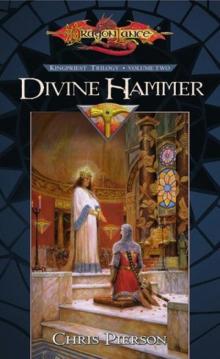 Divine Hammer
Divine Hammer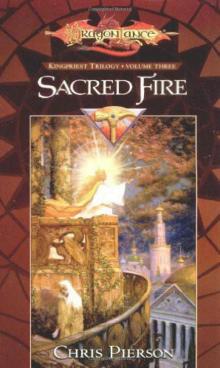 Sacred Fire
Sacred Fire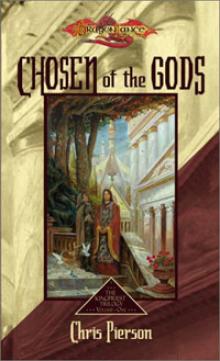 Chosen of the Gods k-1
Chosen of the Gods k-1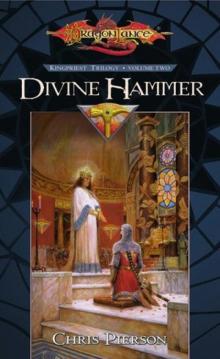 Divine Hammer k-2
Divine Hammer k-2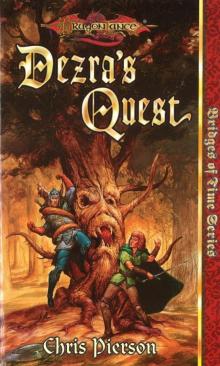 Dezra's Quest
Dezra's Quest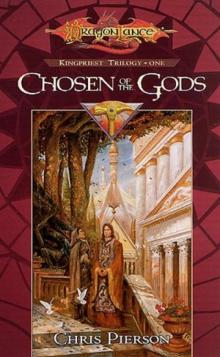 Chosen of the Gods
Chosen of the Gods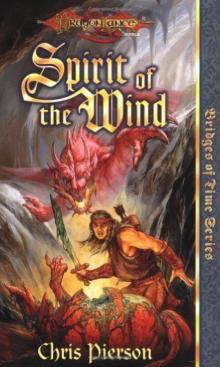 Spirit of the Wind bot-1
Spirit of the Wind bot-1